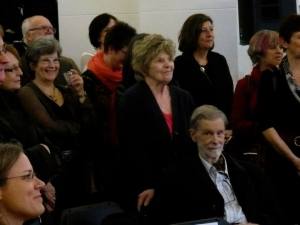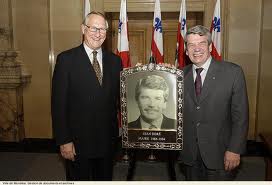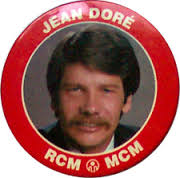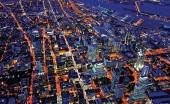Re Ian Bremmer 'Could third-party candidates upend the 2024 US election?' 3 April The current political movement in the USA…
Jean Doré finally receives his due
Written by Diana Thebaud Nicholson // May 24, 2015 // Montreal // Comments Off on Jean Doré finally receives his due
See also: Jean Doré on Wednesday-Night.com
24 May
L’ancien maire Jean Doré reçoit le prix du Mont-Royal
Le maire de Montréal Denis Coderre et Les Amis de la montagne ont remis, dimanche, le prix du Mont-Royal à Jean Doré, pour souligner l’engagement de cet ancien maire de la métropole envers la sauvegarde et la mise en valeur du mont Royal.
C’est sous l’administration du maire Doré (1986-1994) que la Ville a créé le Site du patrimoine du mont Royal, en 1987, et élaboré le premier Plan de mise en valeur du mont Royal, en 1992, peut-on lire dans un communiqué de la Ville de Montréal, publié dimanche.
Jean Doré a également lancé un plan de renaturalisation de la montagne et le projet de réaménagement du belvédère situé au sommet. Communiqué de la Ville de Montréal
15 April
City set to name beach at Île Notre-Dame after former mayor Doré
The city of Montreal is moving ahead with a plan to name the public beach at Île Notre-Dame for former mayor Jean Doré, who is fighting pancreatic cancer.
The city’s executive committee approved the new name at a meeting on Wednesday, leaving Doré to say he was touched by the tribute.
The name contravenes the norms of the Commission de toponymie du Québec, which doesn’t allow a public place to be named for a living person, the civil service report says. But it adds that it’s an exceptional measure. Moreover, the beach has carried Doré’s name unofficially for years, it adds.
Even so, the report says the Commission de toponymie, which is the public body responsible for managing place names in Quebec, will not be able to sanction the name because it contravenes its rules. In practical terms, that means the name won’t be printed on a map. Streets and other places can only be named for people who have been dead for more than a year.
15 December 2014
Ailing Jean Doré’s legacy honoured by former colleagues
The former mayor was diagnosed with pancreatic cancer in September
Former Montreal mayor Jean Doré was celebrated yesterday by his former party, the Montreal Citizens’ Movement.
(CBC) On Sunday, the MCM celebrated the 40th anniversary of its founding, just two days after their long-time leader celebrated his 70th birthday.
It was a bittersweet event, as Doré was diagnosed with pancreatic cancer in September.
His former colleagues focused their attention and emotion towards honouring him and his legacy.
Jean Doré addressed them, choking back tears.
He listed his best memories and proudest accomplishments, both during his time as mayor, and his time in opposition.
“One of the greatest achievements of the MCM, has been to bypass the old east-west divisions,” he said.
Doré and the MCM ended the 26-year reign of Montreal mayor Jean Drapeau in 1986.
Doré’s eight years in power were marked by a renewal of the Old Port, Île St-Hélène, and various public spaces.
14 December
 Hommage à l’ex-maire Jean Doré
Hommage à l’ex-maire Jean Doré
« Vous m’avez permis de réussir ma vie au-delà de mes espérances. Je vous en serai toujours reconnaissant. »
Radio-Canada) Jean Doré à l’honneur. Les membres et les fondateurs du défunt Rassemblement des citoyens de Montréal se sont rassemblés aujourd’hui à l’UQAM pour souligner les 40 ans de la fondation du parti, et le 70e anniversaire de leur ancien chef.
Jean Doré a dirigé Montréal durant 8 ans, entre 1986 et 1994.
Atteint d’un grave cancer du pancréas, il a tenu à remercier ses anciens collègues pour le chemin parcouru.
Le Rassemblement des citoyens de Montréal était une coalition de militants progressistes actifs dans les groupes populaires et syndicaux, mais provenant aussi du Nouveau parti démocratique et du Parti québécois. Formé en 1974, le parti a été actif jusqu’en 2001. Il a notamment instauré la période de questions du public aux assemblées du conseil et les consultations publiques tenues par les commissions permanentes du conseil.
25 November
L’ultime combat de Jean Doré
À 69 ans, Jean Doré livre son ultime combat, celui contre le cancer du pancréas. Maire de Montréal de 1986 à 1994, il a chassé du pouvoir le Parti civique de Jean Drapeau. Il s’est battu pour dépoussiérer Montréal et lui insuffler une vie démocratique. Doré est un battant. La Presse l’a rencontré.
Former mayor Jean Doré on populists, power and ‘the citizens house’
By Linda Gyulai
It’s hard to imagine Montreal without protections for Mount Royal, public consultations, an urban plan, the public’s right to ask questions at city council meetings, women occupying positions of power at city hall; without Accès Montréal offices, municipal services offered in multiple languages, intercultural and public-safety committees, affirmative-action hiring for city jobs.
It’s hard to imagine Montreal without protections for Mount Royal, public consultations, an urban plan, the public’s right to ask questions at city council meetings, women occupying positions of power at city hall; without Accès Montréal offices, municipal services offered in multiple languages, intercultural and public-safety committees, affirmative-action hiring for city jobs.
(Montreal Gazette) A photograph of Nelson Mandela’s visit to Montreal city hall in June 1990 is the only memento Jean Doré displays at home from the eight years he served as mayor of the city.
The framed picture, showing a beaming Doré with Mandela four months after his release from the South African prison where he had been incarcerated for 27 years under racist rule, adorns a wall in the living room of the apartment Doré shares with his spouse, Christiane Sauvé, in downtown Montreal.
“He’s one of the great leaders of humanity, and I cried a lot when he died (in 2013),” Doré said during a sit-down at his home last week to talk about his political career and about coming to terms with his own mortality.
Doré, who will turn 70 next month, was diagnosed with terminal pancreatic cancer in September.
His illness, combined with the fact that Montreal is coming off five years of corruption investigations that toppled two of its recent mayors, and that this year marks the 40th anniversary of the founding of the reformist party he led, the Montreal Citizens’ Movement, has many of its former members reflecting on the legacy of the Doré-led MCM.
With the weight of what preceded and what has succeeded Doré at city hall, many say history is sure to look kindly upon him.
First, people need to be reminded of that legacy.
It’s difficult to imagine the vast city not divided into human-scale districts, without massive municipal investment in non-profit housing, the Biodôme, public art or some of the regional parks that exist across Montreal Island.
Yet Doré’s contribution is often overlooked in a province that has a tradition of preferring populist boss-men and saviours as political leaders.

It took nearly a decade after Doré left office in 1994 before he got his portrait hung with those of the previous mayors of Montreal in city hall’s Hall of Honour.
His successor, Pierre Bourque, bucked tradition during his two terms and wouldn’t add Doré’s bronze plaque to those of the 36 mayors who had preceded him. Gérald Tremblay, who succeeded Bourque, gave Doré his due in 2003, two years after what was left of the MCM had folded.
Until two weeks ago, Doré’s Wikipedia entry featured a recent Journal de Montréal article revealing Doré’s terminal illness and one sentence: he was mayor of Montreal from 1986 to 1994
“What the f— did he do? Nobody knows,” Doré said of the Internet encyclopedia.
His friends have since added a list of accomplishments to the entry.
“You have to understand where we were starting from,” Doré said, of his entry at city hall during the reign of Jean Drapeau, who had first been elected mayor in 1954.
In 1982, the MCM recruited Doré, a lawyer with the Confédération des syndicats nationaux (CSN) union, to run as its mayoral candidate. He was encouraged by his mentor, veteran MCM councillor Michael Fainstat.
Doré, who had previously worked as René Lévesque’s press secretary and as director of a federation of consumer-protection groups assisting working-class families, finished a strong second. For the first time in his mayoral career, Drapeau garnered less than 50 per cent of the vote.
Then, in 1984, Doré won a council seat in a by-election that would bring him a little closer to the mayor’s chair. Doré had a memorable first encounter with Drapeau.
“He welcomed me to ‘his house,’ ” Doré said. “I said, ‘You mean the citizens’ house, Mr. Mayor.’ “
Doré asked Drapeau for an office at city hall for his opposition party. After a decade on council, Fainstat still had to use a public pay phone in Place Jacques-Cartier, across the street, whenever he needed to make a phone call.
“It won’t stay this way,” Doré recalls he warned Drapeau when he refused.
Doré kept his word, aligning himself with other municipal opposition leaders in Quebec. Together, they worked back channels with the Parti Québécois, which was in power at the time, and the Liberals, to get a bill through the National Assembly to force municipalities with 100,000 or more residents to dedicate one-tenth of one per cent of their annual operating budgets to fund research and secretarial expenses for political parties on city council.
Drapeau retired from politics in summer 1986, and Doré and the MCM won a landslide that fall, nabbing 55 of the 58 council seats.
The MCM splintered once in power, its dissidents criticizing a watering-down of the party program and a betrayal by the Doré administration for permitting developers to raze residential buildings in the Overdale neighbourhood downtown.
But the democratizing measures introduced were revolutionary compared to decades of autocratic rule. And who says a city can’t influence foreign affairs? Doré got legislative power for the city to discriminate in municipal-contract awarding against companies that had investments in South Africa when apartheid policies were in force.
Every major project that was built or that began construction in Montreal while Doré was mayor required federal and/or provincial money. But they also required a mayor who could smooth-talk, finagle and occasionally threaten cabinet ministers and their staffers to loosen their change purses.
The 350th anniversary of Montreal’s founding was in 1992 and Doré used the deadline to woo investments from the higher levels of government.
“I found politicians to each sponsor a project,” Doré said, laughing.
Then-premier Robert Bourassa’s pet project was the Biodôme.
A $24-million facelift for Jarry Tennis Stadium was sponsored by federal minister André Ouellet and Quebec minister André Bourbeau, who “were tennis maniacs,” Doré said.
The Pointe-à-Callière museum was completed with an extra $2 million that was needed to solve a humidity problem and that federal minister Marcel Masse funnelled to the city behind Quebec deputy premier Lise Bacon’s back, Doré said. Bacon had vowed the museum would not get “one cent more” than what had been set in a tripartite government agreement.
Then prime minister Brian Mulroney’s project was new facilities at Parc des Îles (today Parc Jean-Drapeau), Doré said. But the launch of related federal work in the Old Port was blocked and risked not being ready for the launch of the 350th celebrations.
Doré phoned Elmer MacKay, the federal minister of public works who hadn’t yet signed off on the work.
” ‘I made a commitment to the prime minister that on the day of the opening of the 350th anniversary, after the mass, we’d open Pointe-à-Callière and then we would go in the Old Port and take the boat to open the park on the other side,’ ” Doré said he told MacKay. ” ‘We cannot do that if the Old Port is not finished. So are you telling me that I’ve got to inform the prime minister that I won’t be able to deliver what I committed to because you’re not putting your act together? I need an answer in the next 24 hours, or I’m calling the prime minister.’ “
MacKay, Doré said, phoned back at the end of the day: “‘Mr. Doré, we’ve settled the problem. We’ll start tomorrow.’ “
But it was the Quebec government that in 1992 downloaded $300 million worth of costs on Montreal and other Quebec municipalities under the “Ryan Reform.” Doré chose diplomatic back channels rather than lead a public fight against Quebec. When that failed, and his administration introduced a reviled surtax on non-residential property to make up the needed municipal revenue, voters turned against Doré and the MCM.
In 1994, Bourque was swept into power.
“I always fought populists,” Doré said. “For me, populists are politicians who unfortunately make their livelihood on the backs of citizens. They say anything, provided it pays dividends, provided it gets them votes. … I said I would appeal to people’s intelligence. I believe deeply that if you take the time to explain things, even if they’re complicated, people will understand in the end because you respect who they are.”
The arc of Doré’s career only reaches across a city, not the planet as was the case for his hero, Mandela.
But within his small territory as mayor, Doré left a mark.
His wish now is that Montrealers will remember.
24 November
Jean Doré : affaibli par le cancer, animé par Montréal
Maire de Montréal de 1986 à 1994, Jean Doré a symbolisé le renouveau de la politique municipale, mettant un terme au règne de 26 ans d’un seul parti. Vingt ans plus tard, après un été béni de soleil et de sport, le diagnostic d’un cancer du pancréas tombe sans appel. Il s’accroche à la vie et aux idées qui lui sont chères. Le temps d’une entrevue, Michel C. Auger l’a retrouvé : amaigri, mais avec le même aplomb dans la voix.
Diagnostic, opération, chimiothérapie. « J’ai retrouvé une certaine allure », confie-t-il. Pour preuve, la simple évocation du mot « Montréal » le fait sourire. Jean Doré sait qu’il est là pour discuter de son sujet favori.
La maladie qui l’afflige ne l’empêche d’ailleurs pas d’envisager avec optimisme l’avenir de la métropole. Celui qui avait mis sur pied, avec le Rassemblement des citoyens de Montréal (RCM), l’Office de consultation de Montréal, se dit « fasciné » devant l’événement Je vois Mtl : « Faire en sorte que les citoyens se sentent responsables du développement de leur ville. Il ne peut y avoir de plus beau témoignage démocratique. »
16 October 2014
La plage du parc Jean-Drapeau baptisée en l’honneur de Jean Doré
La plage du parc Jean-Drapeau, surnommée depuis toujours la plage «Doré», sera baptisée officiellement la plage «Jean-Doré». Le maire de Montréal, Denis Coderre, a annoncé hier matin son intention de demander l’autorisation de changer le nom auprès de la Commission de toponymie du Québec, et une motion en ce sens a déjà été adoptée par Ville-Marie, arrondissement qu’il représente avec le chef de l’opposition, Richard Bergeron.
